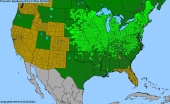"Survivors". That's a funny way of putting it. I've never thought of being a survivor. We just keep plugging along. Far as I know, there aren't so many left of those early days. We mostly got old and died off. When I first wrote about this, I should have said there were hundreds of communities, maybe more. Lots and lots anyways. But founders died or sometimes moved on, and communities withered. Or folks changed priorities as they aged, got families, got jobs, got an itch to move. Or changed politics or sometimes religion. And split up. There were some fun places, gone now. I miss 'em.
Anyway, the oldest here is 77 and the youngest is 1 1/2. There's lots of kids, which is either killing the old folks off, or keeping us young. Don't know which. But, having young children does, at least, keep your thinking younger. I almost never talk to anyone about the "old days". Just mostly talk in a language I don't even mostly understand. New words. New ways of thinking. Or doing. Sometimes I'll listen to music, Beatles or Zep, or the Floyd, and the kids will think it's horrible. Shocking sometimes. The best music in the world, ever, and the youngers don't like/appreciate it.
~~~In any case, the point is, .... something about change. Communities are great. Living in community is great. But they change as time goes on. And you really need to pay attention. Or things just don't go on anymore. At one time, for 20+ years or so, we collected truckloads of clothing and food and furniture and even cars and drove them all over everywhere to various Reservations. 70 semi loads or so. At other times, we had the largest organic/perm gardens in N. Ohio. We had a heck of a lot of Farm Share members, and we supplied many health food stores and co-ops. We used to host various gatherings of up to 350 people for the weekend, in Ceremony for Solstice and May Day and such. Now we milk cows and run a very large Farm School/homeschool for kids from all over. And we teach lots of homesteading skills classes. It used to be we got more long-term folks. Now we get many wwoof'ers. And of course we do more Mid-Wife'ing now. Change.
So, I suppose, we have done a lot. We're still here. If someone wants to ask any questions about how to get along with farming, gardening, goof balls living together, living poor, living well off, midwifery, animals, history, old damn tools, writing books, whatever, ask. And I might even feel like talking some more.





